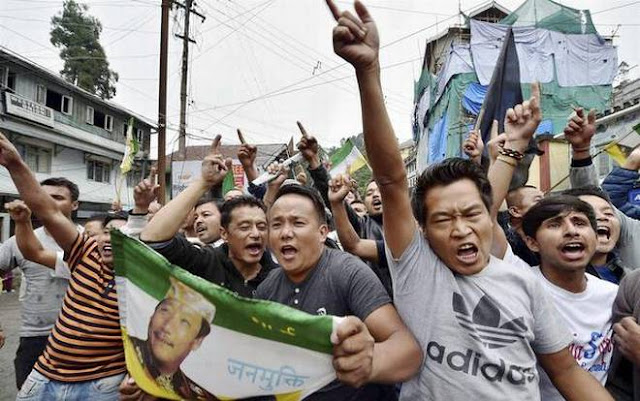Like the steep and narrow roads leading to Darjeeling, politics in these hills of West Bengal is marked by twists and turns. However, amidst the changing seasons, the demand for a separate State of Gorkhaland has remained at the centre of its politics.
The 2021 Assembly polls in the three seats of Darjeeling, Kalimpong and Kurseong will be held on April 17.
The Gorkha Janamukti Morcha (GJM) that held sway in the region for more than a decade is now divided into two factions: one led by GJM founder Bimal Gurung and other by Binay Tamang and Anit Thapa. Both the factions have fielded candidates for each of the three seats. While the GJM factions are in an alliance with the ruling Trinamool Congress, the Gorkha National Liberation Front (GNLF) — the party set up by Subhas Ghising who started the statehood stir in the late 1980s — have joined forces with the Bharatiya Janata Party.
A significant development that has added a new dimension to the politics of the hills did not happen in Darjeeling but in Kolkata when on October 21, 2020, Mr. Gurung made a public appearance after hiding from the law for the past three years and announced his parting of ways with the BJP. He pledged unconditional support to Mamata Banerjee in the Assembly elections.
On the run
Mr. Gurung was on the run after the Trinamool government filed more than 100 cases against him under provisions of the Unlawful Activities (Prevention) Act, following the 104-day-long violent agitation and blockade that he led in 2017. In his absence, the State government gave control of the Gorkhaland Territorial Administration (GTA), a regional autonomous body to Binay Tamang and Anit Thapa who remained the Trinamool’s electoral ally but were against Mr. Gurung. Mr. Gurung, though in hiding, extended his support to the BJP in the 2019 Lok Sabha elections, which saw the BJP nominee Raju Bista win the Darjeeling Lok Sabha seat with a margin of over four lakh votes.
Veteran politician Harka Bahadur Chettri, former GJM MLA from Kalimpong, said the election would decide the future of the movement for separate statehood. He said he wanted to bring both the factions of GJM together but had failed. Mr. Chettri had founded his own political outfit, Jan Andolan Party, in 2017 and had contested the Assembly polls. However, this time he has decided to stay out of the fray.
“ I did not want to add to the confusion by fielding candidates,” he said, adding, “People do not talk about Gorkhaland now. They use a phrase ‘permanent political solution’ for Darjeeling hills.”
‘Permanent political solution’
A “permanent political solution” was also on the lips of Union Home Minister Amit Shah, who, has attacked the Mamata government for the “excesses” committed in 2017. The phrase found mention in the BJP Sankalp Patra for 2019. Earlier in 2014, the saffron party, in its general election manifesto, stated that it would “sympathetically examine and appropriately consider the long-pending demands of the Gorkhas”. The two experiments of giving administrative autonomy to Darjeeling under the Darjeeling Gorkha Hill Council (DGHC) from 1988-2012, and the Gorkhaland Territorial Administration (GTA) established in 2012, have failed and the promise of a permanent political solution is also being viewed with scepticism by the people of the hills.
Days before Mr. Shah campaigned in the hills, Colonel (retd) Ramesh Allay, who was a former member of the GTA, wrote to the Prime Minister’s Office on the issue of “denial of creation of small States vis a vis various assurances by the Prime Minister”. Mr. Allay, president of Bharatiya Gorkha Poorva Sainik Ardh Sainik Sangathan says that the demand of Gorkhaland is almost a century old and the Centre in a letter in 2020 had stated to him that there was no proposal under the consideration of the Government of India for a new State.
Sandip Jain, a resident of Kalimpong and editor of the Himalayan Times, said that it was always the hill parties that set the agenda of the elections in Darjeeling. “What appears crucial to me in these elections is that the hill parties are not setting the agenda. It has always been the hill parties that were the dominant partner as far as issues of the hills were concerned. I don’t see this happening now,” Mr. Jain said.
Political analyst and psephologist Biswanath Chakraborty said that the most interesting thing that has emerged this poll is that there is no dominant player this time. “Elections in Darjeeling were always one-sided with one hill party maintaining sway over the electorate,” he said.
https://www.thehindu.com


Post a Comment
We love to hear from you! What's on your mind?